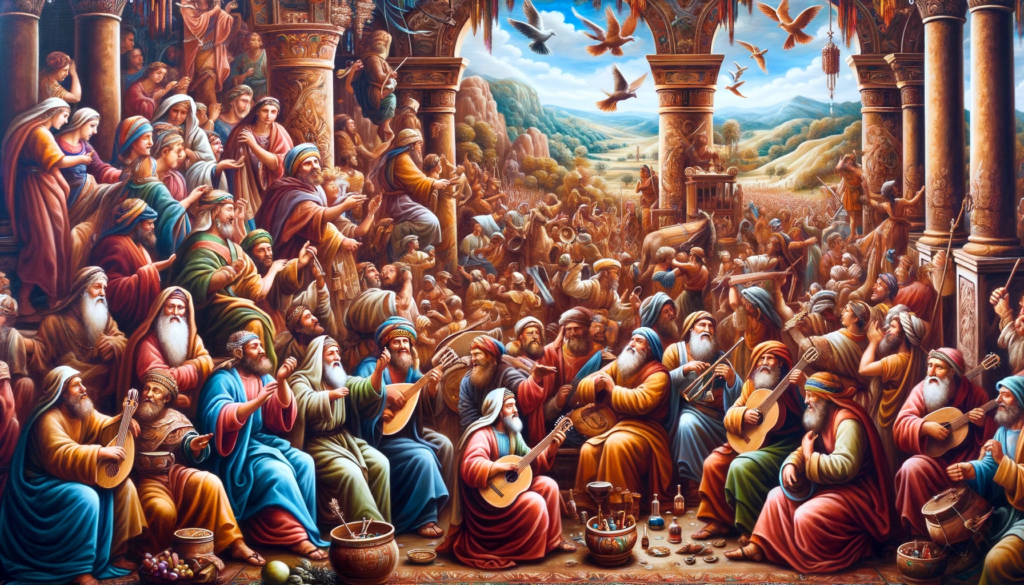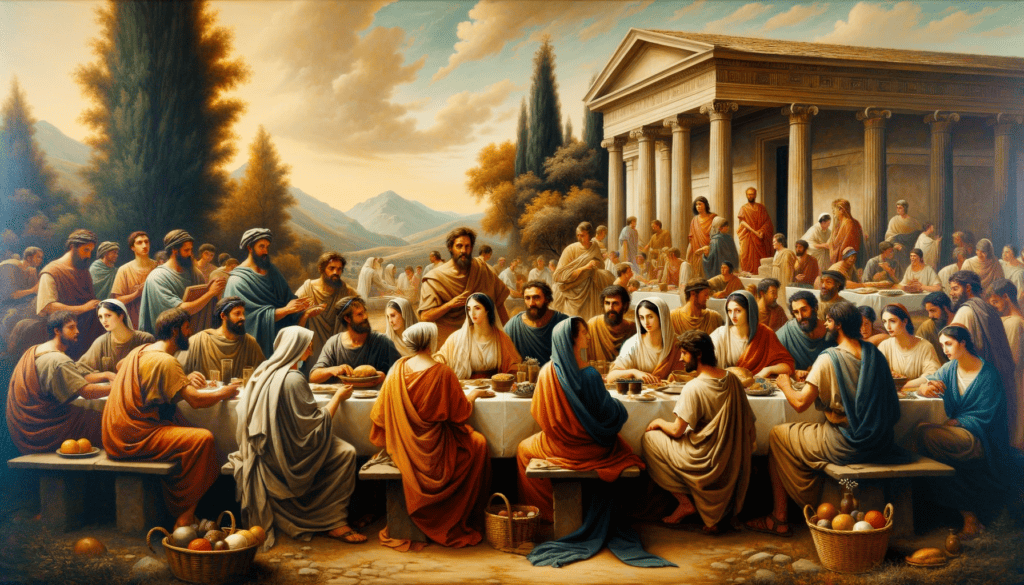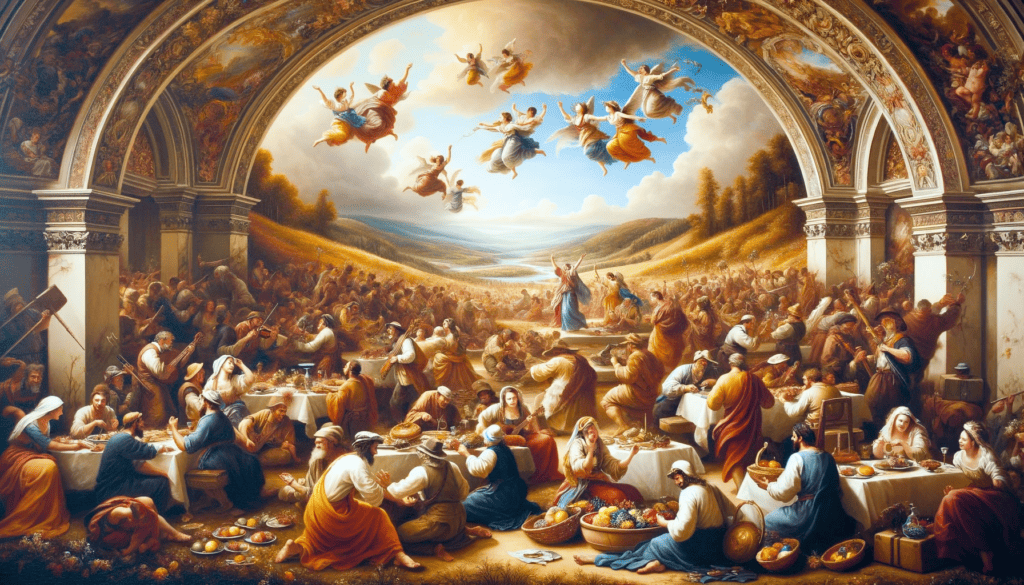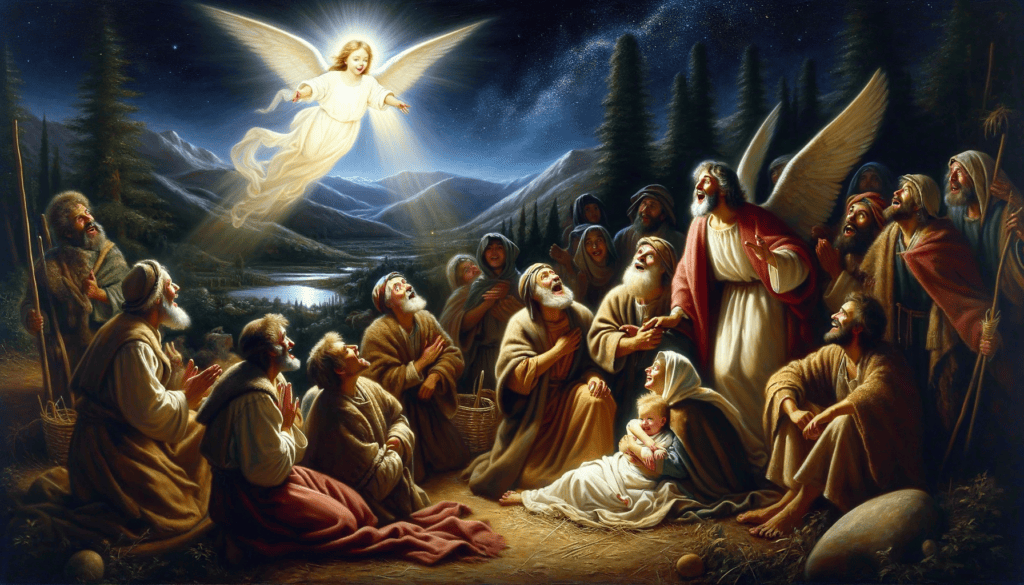25 Bible Verses About Celebrating Holidays (With Commentary)
Did you know that 93% of people worldwide celebrate holidays in some form? Whether it’s the warmth of Christmas, the reflection during Thanksgiving, or the joy of Easter, these moments are deeply rooted in our lives.
Bible verses about celebrating holidays offer us a glimpse into how these festivities can align with faith and tradition. They connect us to a sense of community and provide a spiritual dimension to our merrymaking. Let’s dive into what scripture says about embracing these special times with gratitude and reverence.
Feasts and Celebrations in the Old Testament

Leviticus 23:4
"These are the LORD's appointed festivals, the sacred assemblies you are to proclaim at their appointed times."
The book of Leviticus sets a clear schedule for holy days. Leviticus 23:4 points out specific times for these events. These feasts are not just regular gatherings. They are sacred assemblies, marked as such by God Himself.
These celebrations were vital to the community’s spiritual life. They brought everyone together to remember and rejoice in what God had done for them.
Deuteronomy 16:14-15
"Be joyful at your festival—you, your sons and daughters, your male and female servants, and the Levites, the foreigners, the fatherless and the widows who live in your towns. For seven days celebrate the festival to the LORD your God at the place the LORD will choose. For the LORD your God will bless you in all your harvest and in all the work of your hands, and your joy will be complete."
Joy is at the heart of Deuteronomy 16:14-15 during the feast of tabernacles. It was a time when all people came together, including servants and foreigners.
This inclusivity showed that blessings were meant for everyone. The passage links joyous celebration with prosperity from God.
Nehemiah 8:10
"Nehemiah said, 'Go and enjoy choice food and sweet drinks, and send some to those who have nothing prepared. This day is holy to our Lord. Do not grieve, for the joy of the LORD is your strength.'"
In Nehemiah, we see joy described as strength itself. This scripture ties eating good food and drinking sweet drinks with nourishment beyond physical sustenance.
It also encourages sharing with those who have less. This act turns a personal feast into an opportunity to bless others, fulfilling spiritual needs as well.
Esther 9:22
"As the days on which the Jews got relief from their enemies, and as the month that had been turned for them from sorrow into gladness and from mourning into a holiday; that they should make them days of feasting and gladness, days for sending gifts of food to one another and gifts to the poor."
Esther marks certain days as special because they represent triumph over adversity. During these times, people exchanged gifts and gave generously to the poor.
Celebrating became more than just having fun; it was about remembering victory over enemies and showing kindness during times of plenty.
1 Kings 8:65
"So Solomon observed the festival at that time, and all Israel with him—a vast assembly, people from Lebo Hamath to the Wadi of Egypt. They celebrated before the LORD our God for seven days and seven more days, fourteen days in all."
Here we read about festivities on an impressive scale under King Solomon’s reign—lasting weeks! People from all territories gathered in unity.
This shows us how a leader can set the tone for national holidays by encouraging widespread participation in celebrations that strengthen communal bonds.
Principles of Observing Holidays

Romans 14:5-6 – Personal Convictions in Observance
"One person considers one day more sacred than another; another considers every day alike. Each of them should be fully convinced in their own mind. Whoever regards one day as special does so to the Lord. Whoever eats meat does so to the Lord, for they give thanks to God; and whoever abstains does so to the Lord and gives thanks to God."
The Bible speaks to the heart of holiday observance. In Romans 14:5-6, it acknowledges that people have different beliefs about celebrating special days. Some may observe a day as more significant, while others treat every day alike. What’s important is that each person should be fully convinced in their own mind.
Those who celebrate do so to honor the Lord. And those who don’t, also honor the Lord by not celebrating. The key here is thankfulness. No matter how one chooses to mark a holiday, giving thanks is what counts.
Colossians 2:16-17 – Symbolism Over Judgment
"Therefore do not let anyone judge you by what you eat or drink, or with regard to a religious festival, a New Moon celebration or a Sabbath day. These are a shadow of the things that were to come; the reality, however, is found in Christ."
Colossians 2 advises believers not to judge one another over holidays and sabbaths. These days are symbolic and serve as a shadow of things yet to come—Christ himself being the substance.
Festivals and religious days point beyond themselves to deeper truths about God’s plan for humanity. They’re meant as symbols rather than ends in themselves.
Galatians 4:10 – Questioning Ritualistic Celebrations
"You are observing special days and months and seasons and years!"
Galatians challenges followers of Christ on why they observe certain days or seasons ritually. It suggests there’s freedom from being tied down by schedules and rituals.
This passage implies we’re free from strict adherence if it doesn’t lead us closer to God.
1 Corinthians 5:8 – Sincerity and Truth in Festivities
"Therefore let us keep the Festival, not with the old bread leavened with malice and wickedness, but with the unleavened bread of sincerity and truth."
In festivities, Paul calls Christians in Corinth for sincerity and truth instead of malice or wickedness during festive times—comparing leaven with these negative traits.
He promotes purity symbolized by unleavened bread—a call for clean hearts amid celebration.
Romans 14:17 – Spiritual Over Physical Aspects
"For the kingdom of God is not a matter of eating and drinking, but of righteousness, peace and joy in the Holy Spirit."
Finally, Romans teaches that God’s kingdom isn’t about eating or drinking but righteousness, peace, and joy through the Holy Spirit. It emphasizes spiritual fulfillment over physical feasting during celebrations.
Celebrating with Joy and Gratitude

Psalm 118:24 – Recognizes every day as made by God, worthy of rejoicing.
"This is the day that the LORD has made; let us rejoice and be glad in it."
This verse tells us that every day is a gift from God. We are encouraged to celebrate each one with joy. It’s not just about holidays but finding happiness in the everyday. This approach invites us to be glad always, not just on special occasions.
By seeing each day as worthy of celebration, we turn ordinary moments into treasures. Imagine waking up and deciding today will be full of thanks and laughter.
Ecclesiastes 3:13 – Views eating, drinking, and finding enjoyment as gifts from God.
"That everyone may eat and drink, and find satisfaction in all their toil—this is the gift of God."
Ecclesiastes teaches that pleasure comes from simple things like food and drink. These are seen as blessings tied to our hard work. The verse suggests that feeling content and joyful is part of what God wants for us.
It’s saying enjoy your life’s fullness because it’s approved by the divine. When you sit down for a meal or relax after work, remember it’s okay to feel good about these moments.
Isaiah 12:6 – Calls for exuberant shouting and singing in celebration.
"Shout aloud and sing for joy, people of Zion, for great is the Holy One of Israel among you."
Isaiah encourages loud celebrations with shouts and songs of joy—especially in Jerusalem which was known for its worshipful festivities. The presence of God gives us reason enough to celebrate with all our heart.
When we gather together in festivity, it honors the glory of being in His love. Think trumpets blasting as people share their happiness out loud!
Psalm 30:11-12 – Depicts transformation from mourning to dancing.
"You turned my wailing into dancing; you removed my sackcloth and clothed me with joy, that my heart may sing your praises and not be silent. O LORD my God, I will praise you forever."
Psalm 30 paints a picture where sorrow turns into dance parties! It credits this changeover to God who lifts our spirits high. We’re urged here to spend our lives giving god thanks through festive praise.
Imagine swapping tears for twirls on the dance floor—that’s what this message promotes!
Deuteronomy 16:11 – Instructs rejoicing before the Lord during appointed festivals.
"And rejoice before the LORD your God at the place he will choose as a dwelling for his Name—you, your sons and daughters, your male and female servants, the Levites in your towns, and the foreigners, the fatherless and the widows living among you."
Here we learn about including everyone around us when celebrating festivals ordained by scripture—family members, servants, even strangers nearby should join in the fun! Rejoicing isn’t just suggested; it’s commanded because it reflects gratitude for blessings received through labor.
Next time there’s a holiday feast at your table, think about how sharing this moment can spread joy far beyond your own home.
Examples of Celebrations

Luke 2:10-11 – Announces great joy at Christ’s birth for all people.
"But the angel said to them, 'Do not be afraid. I bring you good news that will cause great joy for all the people. Today in the town of David a Savior has been born to you; he is the Messiah, the Lord.'"
The birth of Jesus is a pivotal moment in the Bible. It marks a time for global celebration. These verses share the angel’s message of great joy to shepherds. They tell us that Jesus’ arrival is joyful news for everyone.
This event shows how celebrations can be deeply meaningful. The angels announced the Savior’s birth, marking it as a cause for rejoicing.
Matthew 26:18 – Jesus observes Passover; ties it to His coming sacrifice.
"He replied, 'Go into the city to a certain man and tell him, ‘The Teacher says: My appointed time is near. I am going to celebrate the Passover with my disciples at your house.’'"
Jesus celebrated Passover with His disciples before He was crucified. This meal was more than just tradition. It symbolized what was about to happen – His sacrifice.
The Last Supper became a significant Christian commemoration because of this night. Christians remember Jesus’ ultimate gift through similar gatherings today.
Luke 15:23-24 – Parable emphasizes celebrating found things or people with feasting and music.
"'Bring the fattened calf and kill it. Let’s have a feast and celebrate. For this son of mine was dead and is alive again; he was lost and is found.' So they began to celebrate."
Here, we learn about celebrating restoration and repentance. A feast and music mark the return of something lost, like in the parable of the prodigal son.
Heaven celebrates when someone turns back from wrong paths, these verses suggest. We see an example here on earth through joyful gatherings after finding lost ones.
John 7:37-38 – Speaks on the last day of Feast of Tabernacles about living water (Holy Spirit).
"On the last and greatest day of the festival, Jesus stood and said in a loud voice, ‘Let anyone who is thirsty come to me and drink. Whoever believes in me, as Scripture has said, rivers of living water will flow from within them.’"
During this Jewish festival, Jesus spoke about spiritual thirst being quenched by Him—living water represents receiving the Holy Spirit during celebrations.
Believers are invited to find spiritual refreshment in their faith during such times. This speaks volumes about integrating belief into our festive traditions.
1 Corinthians 11:25-26 – Discusses remembrance of Jesus’ sacrifice through communion during gatherings.
"In the same way, after supper he took the cup, saying, ‘This cup is the new covenant in my blood; do this, whenever you drink it, in remembrance of me.’ For whenever you eat this bread and drink this cup, you proclaim the Lord’s death until he comes."
Communion is not just ritual—it’s deeply rooted in history and memory. Paul instructed early Christians to use these moments to remember Christ’s death until He returns.
Celebrating isn’t only about happiness but also remembering important events together.
Reflection and Renewal During Holidays

2 Corinthians 13:5
"Examine yourselves to see whether you are in the faith; test yourselves. Do you not realize that Christ Jesus is in you—unless, of course, you fail the test?"
Festive times call for joy. But they also offer moments to reflect. The Bible’s 2 Corinthians 13:5 prompts believers to examine themselves. It asks, are we true in our faith? Even as we celebrate, it’s vital to reconnect with Christ. This is the real reason for celebration.
Amidst the fun and gatherings, this verse serves as a quiet reminder. Self-examination ensures that festivities don’t overshadow faith’s essence. Believers find joy in authenticity, not just in holiday activities.
Psalm 51:10
"Create in me a pure heart, O God, and renew a steadfast spirit within me."
Holidays can inspire us to seek a fresh start. Psalm 51:10 echoes this desire for inner renewal. It calls on people to ask God for a clean heart and unwavering spirit during these reflective times.
Asking for spiritual renewal isn’t only private; it affects how we express joy outwardly too. A pure heart leads to genuine celebrations that reflect true happiness and gratitude.
Lamentations 5:21
"Restore us to yourself, LORD, that we may return; renew our days as of old."
Lamentations speaks of longing—a return to divine favor and past joys linked with present hope is its plea during holidays. Restoration is seen as key here; it turns ordinary days into reasons for renewed celebration.
This yearning reflects an understanding that holidays aren’t just about now but connect us with our history—and hopes—for the future.
Ephesians 5:19-20
"Speak to one another with psalms, hymns, and songs from the Spirit. Sing and make music from your heart to the Lord, always giving thanks to God the Father for everything, in the name of our Lord Jesus Christ."
Ephesians encourages celebrating through music—spiritual songs are part of worshipful thanks.
- Singing together strengthens community bonds.
- Music becomes a form of prayer during holidays.
Gratitude should be at every event’s core, no matter what you’re celebrating or when it occurs.
Psalm 150:6
"Let everything that has breath praise the LORD. Praise the LORD."
Finally, Psalm 150 invites all living things into celebration—it encompasses everything under heaven! Instruments symbolize diverse expressions of joy from all corners:
- Drums might represent vibrant energy;
- Flutes could signify serene peace.
Every creature has a place in this chorus of praise-filled celebrations—the ultimate holiday party!
Summary
Diving into the Bible, we’ve seen how feasts and celebrations are more than just historical events; they’re a vibrant part of spiritual life. You’ve got the principles, the joy, and the gratitude that come with observing holidays, all backed by scriptural examples. It’s clear that celebrating isn’t just about having a good time; it’s about reflection, renewal, and connecting with something greater.
So go ahead, mark your calendars with those special days. Embrace them with open hearts and a spirit of thanksgiving. Whether it’s a quiet moment of gratitude or a full-blown feast with friends and family, let each holiday be a milestone in your journey of faith. And remember, every celebration is an opportunity to grow closer to the essence of these teachings. Now, why not share your favorite holiday verse with someone today? Spread that joy!







